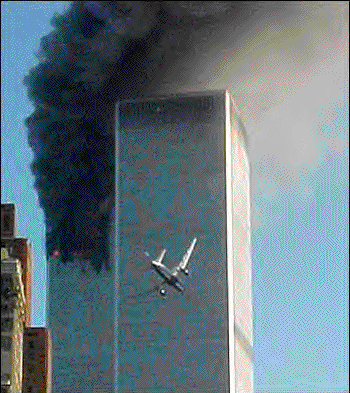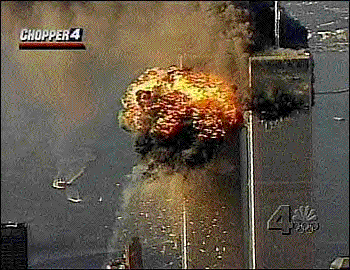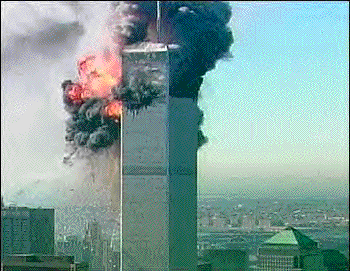Worldwide Terrorism & Crime Against Humanity Index
World Wide Terrorism
"...We are a country awakened to danger and called to defend freedom. Our grief has turned to anger and anger to resolution. Whether we bring our enemies to justice or bring justice to our enemies, justice will be done," President GW Bush
These Acts of Terrorism are the Works of Muslim Extremists;
who received training and funding from Usama Bin Laden's network;
and met with members of Saddam Hussein's Iraqi Intelligence network in Europe.
America will never forget this act of Barbarism

A jet airliner is lined up on one of the World Trade Center towers in New York Tuesday, Sept. 11, 2001. In the most devastating terrorist onslaughts ever waged against the United States, knife-wielding hijackers crashed two airliners into the World Trade Center on Tuesday, toppling its twin 110-story towers. (AP Photo/Carmen Taylor)

Smoke and fire surround the upper floors of the World Trade Center in New York City, Tuesday, Sept. 11, 2001, in this image from television, after a second plane crashed into the building. Planes crashed into the upper floors of both World Trade Center towers minutes apart Tuesday in a horrific scene of explosions and fires that left gaping holes in the 110-story buildings. (AP Photo/NBC)

A ball of fire explodes from one of the towers at the World Trade Center in New York after a plane crashed into it in this image made from television Tuesday Sept. 11, 2001. The aircraft was the second to fly into the tower Tuesday morning. (AP Photo/ABC via APTN)
(more photos of the 9-1-1 Attacks)
Notes From Ground Zero
By Bill Lane Williams
Volunteer Chaplain
Serving as a Volunteer Chaplain at the site of the World Trade Center Tragedy—Ground Zero—has been the experience of a lifetime. Those who have known that I’ve been engaged in this capacity have asked many questions. Many of these have been difficult to answer. How does one write about such horrific scenes? How does one appropriately write about the destruction, especially against the backdrop of the violent acts that caused it? How does one write about something that is beyond comprehension? How do you describe the indescribable?
Though I am reluctant to do so, these lines are written in an effort to provide one perspective on a portion of what I observed and experienced at Ground Zero. Hopefully, this will enable others to be better prepared to give aid and comfort to the many who have been personally affected by the tragic events of September 11, 2001.
The images on our television screens only hint at the stark realities of being at Ground Zero. Standing at the scene and contemplating the trauma, pain, grief, and human suffering is like nothing I’ve ever experienced. No. It’s like everything I’ve ever experienced compressed into one mind-numbing sequence of surrealistic scenes.
Almost two days have passed since I was last at the scene of the carnage. Being there remains with me, though in the most unusual way. As I sit before the computer composing these lines, the taste of Ground Zero is still in my mouth. I will not attempt to describe this taste. It is beyond my capacity to do so. I also do not want to linger very long on such thoughts.
Because the images, sounds and smells are indelibly etched on my memory, it would be easy to become fixated on the devastation. I must remind myself, from time to time, not to do so. My moderate exposure to the scenes at Ground Zero makes my heart heavy for those who have been and are working there day after day. They do not have the luxury of focusing their energies and thoughts on the other, more normal things of life. I’ve looked into their eyes and seen quite clearly the toll that the long and exhausting shifts are extracting from them. For these already weary workers, there is very little down time. Dealing with disaster on a daily basis has become their new normalcy. This, too, is yet another tragedy.
Amidst the destruction at Ground Zero I have been surprised to encounter something wonderful. When gloominess begins to engulf my thoughts, this discovery has proven to be invaluable. All I have to do is to reflect on the faces of many of the people I’ve met on the scene. Most will remain nameless to me, though I take solace in the fact that God knows their names. In my mind’s eye, I still can see the loving, cheerful faces of volunteer workers at the feeding stations. People from throughout the United States, Canada, Europe and other points on the globe have rallied to the cause. I also see images of the site workers from all walks of life. Their dust-covered, determined faces are permanently lodged in my memory. The steely sincerity of a host of police officers, along with the tough, but tender, persona of the firefighters, will never leave me. And, yes, there are the kind people standing in the median on West Street to cheer the workers arriving and departing from Ground Zero. They will never know how their home-crafted signs have blessed those who are passing by. Wonderful, indeed, are the faces I still can see. Each one is an oasis of beauty in the desert of destruction that is Ground Zero.
Etched into the lines on every face is a story. Understanding these stories helps us to be of some benefit to the people traumatized by the events of 9/11 long after the wreckage is cleared. To be sure, they will need our help!
In the following lines, I share some reflections on just a few of my interactions with workers at Ground Zero. There are thousands of stories, which could be told by many others. To be certain that no ones privacy is violated, the names are fictitious. Each story, however, is thoroughly authentic. They are sent your way in an effort to shed some light on what it is like to daily deal with the aftermath of this disaster.
There was the construction foreman. We will call him Jerry. Just a few weeks after the day of destruction, we sat in the shadow of the mammoth red crane used, among other things, to hoist workers in a cage over the wreckage. He was there to do a job. He was determined to do it well. As we stood near the intersection of West Street and Liberty Street, I asked him about the progress being made. He turned from where we stood and pointed a beefy hand toward a boarded up window on the second floor of the Two World Financial Center building. "Do you see that window?" he said, "The day I arrived we crawled through that window on to the rubble." When I asked him how he was doing, he leaned toward me, placed his hefty hand on my shoulder and said with gritty determination, "Ya’ gotta’ do what needs doin’." My final image of Jerry is that of his stocky figure marching, as though he was a soldier into the pit at Ground Zero.
And there was the immigrant sanitation worker from the Dominican Republic. We will call him Alberto. I was surprised to see him there. Though, after giving it some thought, I realized that he, along with his co-workers, were crucial to the work being done at Ground Zero. With so many people working at the site, there are mountains of run-of-the-mill garbage to haul away. When I talked with him several weeks into the clean up effort, Alberto had been working sixteen-hour days at Ground Zero with no time off. As he sat drinking a soda, he looked totally spent. I asked him my usual initial question, "How are you doing?" When he looked up, I could tell that he was taking note of my chaplain’s hat and jacket. A smile then streaked across his face. He told me that he was pleased that I had asked. He said that he was doing quite well. Then with a slight wink and a gentle nod of his head, he looked me right in the eyes and said, "I’m just so glad my daddy taught me about Jesus. Without God, I couldn’t get through this." We talked about the Lord a little longer. He finished his soft drink and, with a surprising spring in his step, he returned to his truck and drove away.
And then there was Jake. Each time that I think of him my heart pounds a little faster. Tears fill my eyes. Jake is a member of the New York City Police Department. In fact, he is a Crime Scene Investigator. His investigative team arrived soon after the events began to unfold that Tuesday morning.
The day that I talked with him in the relative privacy of a Salvation Army tent was almost two months after 9/11. He indicated that he had not yet been able to talk about the events of that day. With a look in his eye that resembled what is known in military circles as "The Thousand-Mile Stare," he opened up, but only ever so slightly.
His unit arrived on the scene just as the first tower began to collapse. As he spoke, his eyes darted back and forth as though he were reliving the scene. "I remember seeing a firefighter running towards us. He was screaming, ‘Everyone out! It’s coming down.’"
Jake then stated in a subdued voice, "My partner and I began to run. It was terrible. Everything was moving and shaking. Sidewalks were collapsing. It was terrible—just terrible." Then he looked at me. When our eyes met, he quickly looked away. He stared at the nearby wall covered with handmade cards lovingly crafted by children from across the nation. He said that the scene was just too horrible to think about.
Then, to my surprise, he quickly turned towards me and fixed his eyes on me. They were but half open. They were misty. His face was full of mourning. He said, "What you see on TV doesn’t tell what it was like. The thing that haunts me still is the noise."
I must have had an inquisitive look on my face, because he explained, "It was like the roaring of a thousand freight trains. There were thunderous explosions. Lots of cracking and popping sounds." He paused to draw a deep breath, "And there was the shrieking of the metal." He closed his eyes and slowly continued, "When those beams were twisting and bending, it was like…" he paused again and began to shake his head in the affirmative, then he added haltingly, "It was — like — mournful moans. I’ll never forget that sound."
Then Jake’s face seemed to harden. I suspected that he’d said all that he really wanted to say. Still, I felt as though I needed to ask about his partner. This was not just to satisfy my curiosity, but for his sake, as well. As we stood there in a temporary shelter erected on Church Street in the heart of the economic capital of the world, Jake nodded toward the piles of debris we both knew were only a few feet away. He stood a little taller. It was almost as though he was snapping to attention in a military formation. In a clear, distinct and determined voice Jake declared, "He’s still out there, and I’m not leavin’ till we find him."
At this point we both knew that our conversation was over. There was really nothing left to say. First we shook hands. Then we hugged. He then carefully filled a Styrofoam cup full of coffee and sat down with two other police officers. I went to stand by the concrete barricade on the western side of Church Street. I looked down through the rubble into what once was a multi-level underground parking garage. The noise of the heavy equipment roared in my ears. I did the best thing that I knew to do. I did the only thing I could do—I prayed.
So much has been said and written about the tragic events of 9/11. Who am I to add more? Indeed, mine is just one more voice from Ground Zero—a voice that joins in with all the others. Together we say, "May we never forget the innocent people whose lives were torn from them that day. May we never forget the families of those who died. May we do all that we can to support the thousands of people who will wrestle with the horror of this day for the rest of their lives."
God willing, a memorial will one day be erected at Ground Zero in honor of all whose lives were taken from them on September 11, 2001. This memorial will also recognize all those who bravely served during the recovery and clean-up stages of the disaster. They are many. Hopefully, these lines have helped you to know more about a few of them. May we never forget.
— Bill L. Williams
Wilmington, Delaware
Editors Note: Bill Williams is the nephew of the webmaster. Many Thanks for the use of this note from Ground Zero.